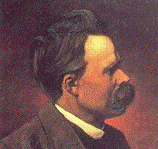October 15: Friedrich Nietzsche
Friedrich Nietzsche (1844)
It was on this date, October 15, 1844, that German philosopher Friedrich Nietzsche was born in Röcken, Saxony, the son of a Lutheran pastor who died when he was five. Brought up by pious relatives, Nietzsche was educated at the universities of Bonn (1864-65) and Leipzig (1864-68), becoming a professor at the University of Basel, Switzerland, at the age of 25. He soon rejected the faith of his father and became a lifelong critic of Christianity. "In truth, there was only one Christian," he wrote in The Antichrist (1888), "and he died on the cross."Nietzsche became friends with composer Richard Wagner, and analyzed his operas in The Birth of Tragedy (Die Geburt Der Tragödie aus dem Geist der Musik, 1872). But by 1878 Nietzsche was captivated by the French Enlightenment and so broke with Wagner over the composer's anti-Semitism and the religiosity displayed in the opera Parsifal.
His most famous work, Thus Spoke Zarathustra (Also Sprach Zarathustra), appeared first in three parts from 1883-1884 and was formally published in 1892. In it, he writes,
God is a thought that makes crooked all that is straight.... Jesus died too soon. He would have repudiated his doctrine if he had lived to my age.
In The Twilight of the Gods (Götzen-Dämmerung, 1888) he wrote,
I call Christianity the one great curse, the one enormous and innermost perversion, the one great instinct of revenge, for which no means are too venomous, too underhand, too underground and too petty — I call it the one immortal blemish of mankind.... The only excuse for God is that he doesn't exist.
And in The Gay Science (Die Fröhliche Wissenschaft, 1882), he wrote,
God is dead. God remains dead. And we have killed him... What was holiest and most powerful of all that the world has yet owned has bled to death under our knives: who will wipe this blood off us?....*
Possibly from a visit to a brothel, Nietzsche contracted syphilis, which caused his mind to deteriorate toward the end of his life. He died on 25 August 1900, but was not forgotten.
Friedrich Nietzsche was an Atheist and his philosophy influenced Thomas Mann, Herman Hesse, André Malraux, André Gide, Albert Camus, Rainer Maria Rilke, Stefan George, Sigmund Freud, Jean Paul Sartre and (unfortunately) Nazi Germany. Nietzsche's idea of the Übermensch or "higher man" (sometimes translated as “Superman”), which he conceived as a dynamic, perceptive person, was reinterpreted by the Nazis as the "master race" – a concept Nietzsche would have renounced: He was neither anti-Semitic, nor a militarist, nor even a nationalist, as he had renounced his Prussian citizenship in 1869!
* To this, Salvador Dalí quipped, "What? I had just learned that God did not exist, and now someone was informing me that he had died." (Diary of a Genius, 1966).
Originally published October 2003 by Ronald Bruce Meyer.


